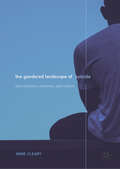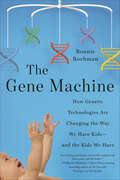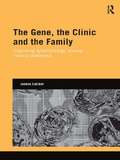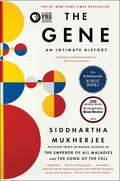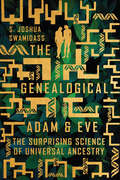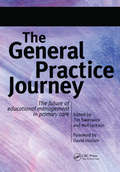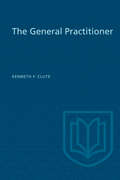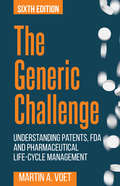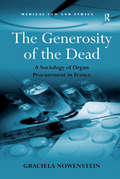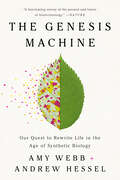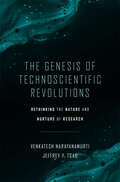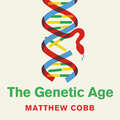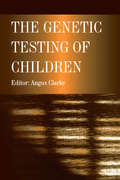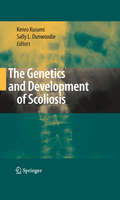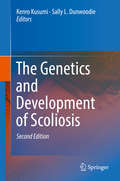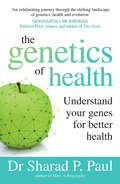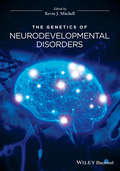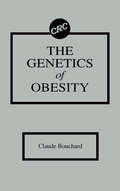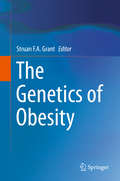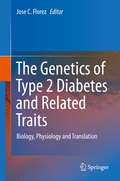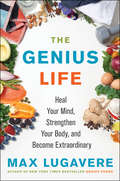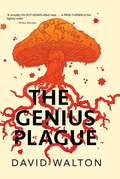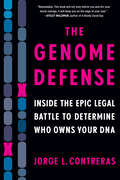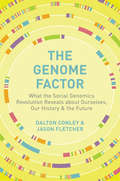- Table View
- List View
The Gemini-Sagittarius Connection (Opposites in Love, Medical Zodiac Romances #3)
by Janet Lane-Walters Canada Jude PittmanCan these two find a way to uncover the underhanded events at the hospital? They’re on opposite sides but the attraction between them is strong. She’s a widow who fought to save her husband’s life during a code. She feels guilty because the love she and her husband shared had died before his death. He assisted at the code but he feels guilty since he was the one who was responsible for the short staffing the night her husband died. Now they face falling in love and trying to solve the problems between the nurse’s union and the president of the hospital’s Board who wants a take over of the hospital by his hospital group. Is their connection strong enough to survive?
The Gendered Landscape of Suicide: Masculinities, Emotions, and Culture
by Anne ClearyThis book is an attempt to understand suicide from the perspective of a group of men who decided to take their own lives. Their stories imply that male suicide is not, as frequently portrayed, an impulsive action arising from particular, sex-specific, causes but relates to a cluster of interlinked issues which accumulate over time. These issues were not distinctively male concerns but were connected to gender in that the men’s difficulties were exacerbated by the existence of an emotional culture which inhibited males from expressing specific feelings. The prevailing form of masculinity impeded them in developing knowledge of, and speaking about, their emotional needs and from accessing help and this prolonged their suffering and made suicide a possibility. These men produced compelling accounts of their emotional pain which belied notions of male inexpressiveness but the findings point to a link between emotionally constraining cultures and suicidal behaviour for some groups of men.
The Gene Machine: How Genetic Technologies Are Changing the Way We Have Kids—and the Kids We Have
by Bonnie RochmanA sharp-eyed exploration of the promise and peril of having children in an age of genetic tests and interventionsIs screening for disease in an embryo a humane form of family planning or a slippery slope toward eugenics? Should doctors tell you that your infant daughter is genetically predisposed to breast cancer? If tests revealed that your toddler has a genetic mutation whose significance isn’t clear, would you want to know?In The Gene Machine, the award-winning journalist Bonnie Rochman deftly explores these hot-button questions, guiding us through the new frontier of gene technology and how it is transforming medicine, bioethics, health care, and the factors that shape a family. Rochman tells the stories of scientists working to unlock the secrets of the human genome; genetic counselors and spiritual advisers guiding mothers and fathers through life-changing choices; and, of course, parents (including Rochman herself) grappling with revelations that are sometimes joyous, sometimes heartbreaking, but always profound. She navigates the dizzying and constantly expanding array of prenatal and postnatal tests, from carrier screening to genome sequencing, while considering how access to more tests is altering perceptions of disability and changing the conversation about what sort of life is worth living and who draws the line. Along the way, she highlights the most urgent ethical quandary: Is this technology a triumph of modern medicine or a Pandora’s box of possibilities?Propelled by human narratives and meticulously reported, The Gene Machine is both a scientific road map and a meditation on our power to shape the future. It is a book that gets to the very core of what it means to be human.
The Gene, the Clinic, and the Family: Diagnosing Dysmorphology, Reviving Medical Dominance (Genetics and Society)
by Joanna LatimerWhile some theorists argue that medicine is caught in a relentless process of ‘geneticization’ and others offer a thesis of biomedicalization, there is still little research that explores how these effects are accomplished in practice. Joanna Latimer, whose groundbreaking ethnography on acute medicine gave us the social science classic The Conduct of Care, moves her focus from the bedside to the clinic in this in-depth study of genetic medicine. Against current thinking that proselytises the rise of laboratory science, Professor Latimer shows how the genetic clinic is at the heart of the revolution in the new genetics. Tracing how work on the abnormal in an embryonic genetic science, dysmorphology, is changing our thinking about the normal, The Gene, the Clinic, and the Family charts new understandings about family, procreation and choice. Far from medicine experiencing the much-proclaimed ‘death of the clinic’, this book shows how medicine is both reasserting its status as a science and revitalising its dominance over society, not only for now but for societies in the future. This book will appeal to students, scholars and professionals interested in medical sociology, science and technology studies, the anthropology of science, medical science and genetics, as well as genetic counselling.
The Gene: An Intimate History
by Siddhartha MukherjeeThe #1 NEW YORK TIMES Bestseller The basis for the PBS Ken Burns Documentary The Gene: An Intimate History Now includes an excerpt from Siddhartha Mukherjee&’s new book Song of the Cell! From the Pulitzer Prize–winning author of The Emperor of All Maladies—a fascinating history of the gene and &“a magisterial account of how human minds have laboriously, ingeniously picked apart what makes us tick&” (Elle). &“Sid Mukherjee has the uncanny ability to bring together science, history, and the future in a way that is understandable and riveting, guiding us through both time and the mystery of life itself.&” —Ken Burns“Dr. Siddhartha Mukherjee dazzled readers with his Pulitzer Prize-winning The Emperor of All Maladies in 2010. That achievement was evidently just a warm-up for his virtuoso performance in The Gene: An Intimate History, in which he braids science, history, and memoir into an epic with all the range and biblical thunder of Paradise Lost” (The New York Times). In this biography Mukherjee brings to life the quest to understand human heredity and its surprising influence on our lives, personalities, identities, fates, and choices. “Mukherjee expresses abstract intellectual ideas through emotional stories…[and] swaddles his medical rigor with rhapsodic tenderness, surprising vulnerability, and occasional flashes of pure poetry” (The Washington Post). Throughout, the story of Mukherjee’s own family—with its tragic and bewildering history of mental illness—reminds us of the questions that hang over our ability to translate the science of genetics from the laboratory to the real world. In riveting and dramatic prose, he describes the centuries of research and experimentation—from Aristotle and Pythagoras to Mendel and Darwin, from Boveri and Morgan to Crick, Watson and Franklin, all the way through the revolutionary twenty-first century innovators who mapped the human genome. “A fascinating and often sobering history of how humans came to understand the roles of genes in making us who we are—and what our manipulation of those genes might mean for our future” (Milwaukee Journal-Sentinel), The Gene is the revelatory and magisterial history of a scientific idea coming to life, the most crucial science of our time, intimately explained by a master. “The Gene is a book we all should read” (USA TODAY).
The Genealogical Adam and Eve: The Surprising Science of Universal Ancestry
by S. Joshua SwamidassThe Genealogical Adam and Evealongsidehumanancestrygeneticgenealogicalgenealogicalgenealogical
The General Practice Journey: The Future of Educational Management in Primary Care
by Neil Jackson Tim SwanickVocational training is the preferred method for developing practical and other workplace dental skills. It is mandatory for all UK dental graduates under the guidance of the Committee on Vocational Training (CVT). This book is for all dentists who have an interest in vocational training, and is particularly useful for trainers, VDPs and VT advisers/regional advisors. This is a unique and comprehensive guide to training in practice. All aspects of training and teaching methods are included and practical advice given on topics such as communication and presentation skills, finance, barriers to training and assessment. The book also covers the latest developments in clinical governance and legal matters. Clear, straightforward and free of jargon, it will enable dental practitioners to become competent educators with ease.
The General Practitioner
by Kenneth CluteAn important and definitive study and critique of 86 general practices in Ontario and Nova Scotia, with particular attention to the quality of medical care and to problems of medical education and of the organization of medical care as these relate to quality. It was conceived by the College of General Practice of Canada and directed by Kenneth F. Clute. The book is addressed to all those who are interested in the broader aspects of the question of how people can best be provided with good medical care.
The Generic Challenge: Understanding Patents, FDA and Pharmaceutical Life-Cycle Management (Sixth Edition)
by Martin A VoetThis Sixth Edition of The Generic Challenge provides important new updates on current regulatory, legal and commercial issues affecting brand and generic pharmaceutical products, including new laws establishing generics for biologics, and changes brought
The Generosity of the Dead: A Sociology of Organ Procurement in France (Medical Law and Ethics)
by Graciela NowensteinThere has been a general assumption in the international debate surrounding organ procurement that Presumed Consent (opting-out) systems produce better results than Express Consent (opting-in) systems. This study uses the French case to challenge this widely held assumption and argues that the French presumed consent systems coexist with patterns of behaviour that in practice do not mobilize the law. It explores four key areas to current research in socio-legal studies focussing on the state and nature of social solidarity, social engineering and the changing nature of the citizen-state relations, state intervention in the event of death and discretion in use of corpses and recent modifications of the status of medical professionals as figures of authority and agents of state policy. Using material based on interviews with medical professionals, this title will be a valuable resource for researchers, academics, policy-makers and practitioners with an interest in this complex and topical subject.
The Genesis Machine: Our Quest to Rewrite Life in the Age of Synthetic Biology
by Amy Webb Andrew HesselNamed one of The New Yorker's BEST BOOKS OF 2022 SO FARThe next frontier in technology is inside our own bodies. Synthetic biology will revolutionize how we define family, how we identify disease and treat aging, where we make our homes, and how we nourish ourselves. This fast-growing field—which uses computers to modify or rewrite genetic code—has created revolutionary, groundbreaking solutions such as the mRNA COVID vaccines, IVF, and lab-grown hamburger that tastes like the real thing. It gives us options to deal with existential threats: climate change, food insecurity, and access to fuel. But there are significant risks. Who should decide how to engineer living organisms? Whether engineered organisms should be planted, farmed, and released into the wild? Should there be limits to human enhancements? What cyber-biological risks are looming? Could a future biological war, using engineered organisms, cause a mass extinction event? Amy Webb and Andrew Hessel&’s riveting examination of synthetic biology and the bioeconomy provide the background for thinking through the upcoming risks and moral dilemmas posed by redesigning life, as well as the vast opportunities waiting for us on the horizon.
The Genesis of Technoscientific Revolutions: Rethinking the Nature and Nurture of Research
by Venkatesh Narayanamurti Jeffrey Y. TsaoResearch powers innovation and technoscientific advance, but it is due for a rethink, one consistent with its deeply holistic nature, requiring deeply human nurturing. Research is a deeply human endeavor that must be nurtured to achieve its full potential. As with tending a garden, care must be taken to organize, plant, feed, and weed—and the manner in which this nurturing is done must be consistent with the nature of what is being nurtured. In The Genesis of Technoscientific Revolutions, Venkatesh Narayanamurti and Jeffrey Tsao propose a new and holistic system, a rethinking of the nature and nurturing of research. They share lessons from their vast research experience in the physical sciences and engineering, as well as from perspectives drawn from the history and philosophy of science and technology, research policy and management, and the evolutionary biological, complexity, physical, and economic sciences. Narayanamurti and Tsao argue that research is a recursive, reciprocal process at many levels: between science and technology; between questions and answer finding; and between the consolidation and challenging of conventional wisdom. These fundamental aspects of the nature of research should be reflected in how it is nurtured. To that end, Narayanamurti and Tsao propose aligning organization, funding, and governance with research; embracing a culture of holistic technoscientific exploration; and instructing people with care and accountability.
The Genetic Age: Our Perilous Quest To Edit Life
by Matthew Cobb'Brilliant .. I cannot recommend this book strongly enough' - Henry Marsh, New Statesman (about The Idea of the Brain)A new gene editing technology, invented just seven years ago, has turned humanity into gods. Enabling us to manipulate the genes in virtually any organism with exquisite precision, CRISPR has given scientists a degree of control that was undreamt of even in science fiction.But CRISPR is just the latest, giant leap in a long journey to master genetics. The Genetic Age shows the astonishing, world-changing potential of the new genetics and the possible threats it poses, sifting between fantasy and the reality when it comes to both benefits and dangers.By placing each phase of discovery, anticipation and fear in the context of over fifty years of attempts to master the natural world, Matthew Cobb, the Baillie-Gifford-shortlisted author of The Idea of the Brain, weaves the stories of science, history and culture to shed new light on our future. With the powers now at our disposal, it is afuture that is almost impossible to imagine - but it is one we will create ourselves.
The Genetic Testing of Children
by Angus ClarkeThis book, written by a leading geneticist, examines the ethical and social issues raised by the genetic testing of children. The opinions of geneticists, ethicists and affected families are all included to give a balanced view of this controversial field. Issues covered include confidentiality, potential abuses of genetic information (eg the use of test results by insurance companies) and the value of predictive genetic testing.The aim of the book is to improve awareness of the complexity of the issues raised and provide suggestions as to how the discussions must develop - it therefore raises new questions as well as answering those that already exist.
The Genetics and Development of Scoliosis
by Kenro Kusumi Sally L. DunwoodieDevelopmental genetic studies of the spine and linkage and family-based association studies have led to recent advances in understanding the genetic etiology of idiopathic, neuromuscular, and congenital forms of scoliosis. The book is written by leaders in genetic and developmental research on scoliosis and developmental studies of the spine.
The Genetics and Development of Scoliosis
by Kenro Kusumi Sally L. DunwoodieOur understanding of the genetic and developmental mechanisms underlying scoliosis is rapidly evolving, this timely second edition of The Genetics and Development of Scoliosis is to provide researchers, clinicians, and students with the most current views in this field. This volume brings together leaders in understanding congenital and idiopathic scoliosis to present the current state of research, and to compare the genetic etiology of these conditions, in order to identify potential shared developmental mechanisms. This book will summarize the recent advances in studies of spinal development and how disruptions during embryogenesis in embryonic segmentation can lead to congenital vertebral defects. In addition, recent reports of genetic loci predisposing patients to develop juvenile and adolescent idiopathic scoliosis will be presented, and key clinical features are reviewed. Finally, there will be discussion of how genetic heterogeneity and gene-environment interactions may contribute to congenital scoliosis and isolated vertebral malformations.
The Genetics of Health: Understand Your Genes for Better Health
by Sharad P. Paul‘An exhilarating journey through the shifting landscape of genetics, health and evolution’ Pulitzer Prize winning author of The Emperor of Maladies, Siddhartha Mukherjee Take charge of your health by understanding the connection between our evolutionary past and our future wellbeing with this practical guide to personalised health and nutrition—from distinguished physician Dr. Sharad Paul Recognised as one of the best in his field, surgeon, academic, and philanthropist, Dr. Sharad Paul combines everyday health with evolutionary biology and explains how to improve your overall wellness by following a diet and exercise plan according to your gene type. Starting with our brains, this book covers everything from skin and muscles, to hearts, diets, and stress management. Throughout, Dr. Paul shares key information and provides steps to improve our daily wellbeing—impacting everything from our energy levels to memory retention to our overall longevity. Our evolutionary past and genetic makeup determine how and why the body works the way it does and how it all combines to make us unique individuals. Presenting a compelling blend of medical mysteries, patient stories, and science, Dr. Paul has developed a revolutionary approach to wellness that will result in beautiful skin at any age, a healthier diet for muscle endurance and skeletal strength, a more resilient and efficient heart, better mood and memory balance, and more. From learning to eat for your gene-type to the importance of movement and understanding brain development, this book answers several questions, including: Is cholesterol good or bad? How do we fight the war on cancer? How does stress affect our health? Is there science behind psychiatry? Ultimately, the message is this: to achieve better health, we need to understand our evolutionary past—and while our genes carry an individual blueprint, transformation towards wellness is always possible. Praise for Dr Sharad Paul 'Open heart surgeon' - Time Magazine
The Genetics of Neurodevelopmental Disorders
by Kevin J. Mitchellpsychological development. The text concludes by examining the important clinical implications of the recent advances in the field, from recognition of the genetic causes in individual patients to development of new treatments and interventions.A timely synthesis, The Genetics of Neurodevelopmental Disorders is a unique and essential resource for neuroscientists, geneticists, neurologists and psychiatrists and an accessible and up-to-date overview for medical and science students.
The Genetics of Obesity
by Claude BouchardThis book provides a comprehensive compilation of the evidence available regarding the role of genetic differences in the etiology of human obesities and their health and metabolic implications. It also identifies the most promising research areas, methods, and strategies for use in future efforts to understand the genetic basis of obesities and their consequences on human health. Leading researchers in their respective fields present contributed chapters on such topics as etiology and the prevalence of obesities, nongenetic determinants of obesity and fat topography, and animal models and molecular biological technology used to delineate the genetic basis of human obesities. A major portion of the book is devoted to human genetic research and clinical observations encompassing adoption studies, twin studies, family studies, single gene effects, temporal trends and etiology heterogeneity, energy intake and food preference, energy expenditure, and susceptibility to metabolic derangements in the obese state. Future directions of research in the field are covered in the book as well.
The Genetics of Obesity
by Struan F.A. GrantIn the past four years, many genetic loci have been implicated for BMI from the outcomes of genome-wide association studies (GWAS), primarily in adults. Insulin-induced gene 2 (INSIG2) was the first locus to be reported by this method to have a role in obesity but replication attempts have yielded inconsistent outcomes. The identification of the second locus, the fat mass- and obesity-associated gene (FTO), h has been more robustly observed by others. Studies from both FTO knock out and FTO overexpression mouse model support the fact that FTO is directly involved in the regulation of energy intake and metabolism in mice, where the lack of FTO expression leads to leanness while enhanced expression of FTO leads to obesity. Along with numerous other studies, a number of genetic variants have been established robustly in the context of obesity, giving us fresh insights into the pathogenesis of the disease. This book will give a comprehensive overview of efforts aimed at uncovering genetic variants associated with obesity, which have been particularly successful in the past 5 years with the advent of genome-wide association studies (GWAS). This book will cover this state of the art technology and its application to obesity in great detail. Topics covered will include genetics of childhood obesity, genetics of syndromic obesity, copy number variants and extreme obesity, co-morbidities of obesity genetics, and functional follow-up of genetic variants.
The Genetics of Type 2 Diabetes and Related Traits
by Jose C. FlorezThis book presents the state of the art of type 2 diabetes genetics, from the process of genetic discovery to its interpretation and clinical application, and illustrates a model for other complex human phenotypes. The first section explores genome-wide association studies, the extension of this method to less accessible phenotypes and the arrival of next-generation sequencing. A further section goes beyond genetics to illustrate how other data sources can help interpret genetic data, such as leveraging population diversity, the correlation of genetic associations with physiological measurements, gene expression modulation, environmental factors and our microbial commensals. The third section describes advances in elucidating the complex path from association to function using in-depth sequencing and functional studies of the cellular and molecular effects of genes in the loci identified by genetics. The final section links our current understanding with clinically relevant questions, such as prediction, interactions with drugs or nutrients, and disease prevention, and paints a realistic but hopeful vision of the future.
The Genius Life: Heal Your Mind, Strengthen Your Body, and Become Extraordinary (Genius Living #2)
by Max LugavereThe author of the New York Times bestselling Genius Foods is back with a lifestyle program for resetting your brain and body to its “factory settings,” to help fight fatigue, anxiety, and depression and to optimize cognitive health for a longer and healthier life.The human body was honed under conditions that no longer exist. The modern world has changed dramatically since our days as hunter gatherers, and it has caused widespread anxiety, stress, and disease, leaving our brains in despair. But science proves that the body and brain can be healed with the intervention of lifestyle protocols that help us to regain our cognitive birthright.In The Genius Life, Lugavere expands the Genius Foods plan, which focused on nutrition and how it affects brain health, and expands it to encompass a full lifestyle protocol. We know now that the health of our brains—including our cognitive function and emotional wellness—depend on the health of our gut, endocrine, cardiac and nervous systems as there is a constant feedback loop between all systems. Drawing on globe-spanning research into circadian biology, psychology, dementia prevention, cognitive optimization, and exercise physiology, The Genius Life shows how to integrate healthy choices in all aspects of our daily routines: eating, exercising, sleeping, detoxing, and more to create a healthy foundation for optimal cognitive health and performance. Among Max’s groundbreaking findings, you will discover:· A trick that gives you the equivalent of a “marathon” workout, in 10 minutes· How to get the benefits of an extra 1-2 servings of veggies daily without eating them· The hidden chemicals in your home that could be making you fat and sick· How to boost melatonin levels by up to 58% for deeper sleep without supplementsThe book features an achievable prescriptive 21-day plan for Genius Living that includes daily workouts, meal plans, and meal prep tips, and accompanied with helpful suggestions for healthy swaps and snacks
The Genius Plague
by David WaltonTHE CONTAGION IS IN YOUR MINDIn this science fiction thriller, brothers are pitted against each other as a pandemic threatens to destabilize world governments by exerting a subtle mind control over survivors.Neil Johns has just started his dream job as a code breaker in the NSA when his brother, Paul, a mycologist, goes missing on a trip to collect samples in the Amazon jungle. Paul returns with a gap in his memory and a fungal infection that almost kills him. But once he recuperates, he has enhanced communication, memory, and pattern recognition. Meanwhile, something is happening in South America; others, like Paul, have also fallen ill and recovered with abilities they didn't have before. But that's not the only pattern--the survivors, from entire remote Brazilian tribes to American tourists, all seem to be working toward a common, and deadly, goal. Neil soon uncovers a secret and unexplained alliance between governments that have traditionally been enemies. Meanwhile Paul becomes increasingly secretive and erratic. Paul sees the fungus as the next stage of human evolution, while Neil is convinced that it is driving its human hosts to destruction. Brother must oppose brother on an increasingly fraught international stage, with the stakes: the free will of every human on earth. Can humanity use this force for good, or are we becoming the pawns of an utterly alien intelligence?
The Genome Defense: Inside the Epic Legal Battle to Determine Who Owns Your DNA
by Jorge L. ContrerasIn this riveting, behind-the-scenes courtroom drama, a brilliant legal team battles corporate greed and government overreach for our fundamental right to control our genes. When attorney Chris Hansen learned that the U.S. government was issuing patents for human genes to biotech companies, his first thought was, How can a corporation own what makes us who we are? Then he discovered that women were being charged exorbitant fees to test for hereditary breast and ovarian cancers, tests they desperately needed—all because Myriad Genetics had patented the famous BRCA genes. So he sued them. Jorge L. Contreras, one of the nation&’s foremost authorities on human genetics law, has devoted years to investigating the groundbreaking civil rights case known as AMP v. Myriad. In The Genome Defense Contreras gives us the view from inside as Hansen and his team of ACLU lawyers, along with a committed group of activists, scientists, and physicians, take their one-in-a-million case all the way to the U.S. Supreme Court. Contreras interviewed more than a hundred key players involved in all aspects of the case—from judges and policy makers to ethicists and genetic counselors, as well as cancer survivors and those whose lives would be impacted by the decision—expertly weaving together their stories into a fascinating narrative of this pivotal moment in history. The Genome Defense is a powerful and compelling story about how society must balance scientific discovery with corporate profits and the rights of all people.
The Genome Factor: What the Social Genomics Revolution Reveals about Ourselves, Our History, and the Future
by Dalton Conley Jason FletcherFor a century, social scientists have avoided genetics like the plague. But the nature-nurture wars are over. In the past decade, a small but intrepid group of economists, political scientists, and sociologists have harnessed the genomics revolution to paint a more complete picture of human social life than ever before. The Genome Factor describes the latest astonishing discoveries being made at the scientific frontier where genomics and the social sciences intersect.The Genome Factor reveals that there are real genetic differences by racial ancestry—but ones that don't conform to what we call black, white, or Latino. Genes explain a significant share of who gets ahead in society and who does not, but instead of giving rise to a genotocracy, genes often act as engines of mobility that counter social disadvantage. An increasing number of us are marrying partners with similar education levels as ourselves, but genetically speaking, humans are mixing it up more than ever before with respect to mating and reproduction. These are just a few of the many findings presented in this illuminating and entertaining book, which also tackles controversial topics such as genetically personalized education and the future of reproduction in a world where more and more of us are taking advantage of cheap genotyping services like 23andMe to find out what our genes may hold in store for ourselves and our children.The Genome Factor shows how genomics is transforming the social sciences—and how social scientists are integrating both nature and nurture into a unified, comprehensive understanding of human behavior at both the individual and society-wide levels.

